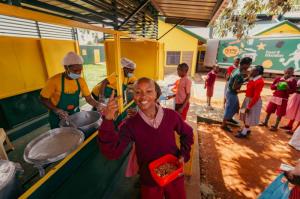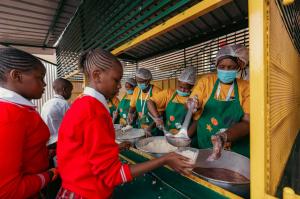Food4Education Urges African Governments to Make School Feeding a Right, Not a Privilege
This Day of the African Child, nearly 60 million African children risk going hungry in school as government funding falls short.
NAIROBI, KENYA, June 16, 2025 /EINPresswire.com/ -- As Africa marks the Day of the African Child under the African Union’s 2025 theme, “Planning and budgeting for children's rights: progress since 2010,” Food4Education is calling on African governments and global partners to push school feeding to the top of their budgets and agendas.90 million African children are enrolled in school, but 50 million of them show up on an empty stomach each day. Yet, only 14% of global school feeding programs are located in Africa, home to the world’s youngest population. With 1 in 4 people in the world expected to be African in 2050, these children represent Africa’s human capital potential and the future of the global talent workforce.
“The stakes are higher than ever,” says Wawira Njiru, Founder and CEO of Food4Education. “We can’t afford to see child malnutrition and socioeconomic growth as separate issues. We know well-nourished children perform better in class, but when school feeding is locally rooted, we also create jobs, support smallholder farmers, and strengthen local economies. If we want to build a prosperous Africa for our children, this is where we start.”
Food4Education began 13 years ago in a makeshift kitchen serving 25 children. Today, it delivers over 500,000 hot, nutritious meals every school day across Kenya, in partnership with local governments, smallholder farmers, and community stakeholders. By sourcing ingredients from over 100 tons of locally grown food, 80% of it from smallholder farmers, Food4Education is also building supply chains that reinvest in rural economies.
Research shows that every $1 invested in school meals can generate up to $20 in social and economic returns. In Kenya, Food4Education has helped draw children to more than 1,500 schools, increasing enrollment by over 20% in counties like Nairobi and Mombasa, while reducing absenteeism and improving academic performance by up to 30% in partner schools.
In countries like Ghana, Rwanda, Ethiopia, and Nigeria, governments are piloting or expanding school feeding programs. 80% of African governments have budgets allocated for school feeding, yet across the continent, many operational challenges prevent implementation. This intention-action gap is what inspired F4E’s Pan-African blueprint to mainstream school feeding programs across the continent so that no child ever has to learn on an empty stomach.
Drawing on its 13-year journey establishing Africa’s award-winning, locally-rooted school feeding program, Food4Education has identified 4 critical steps African governments can take to deliver on their agendas:
1. Embed Sustainable Finance and Enabling Policy: for sustainability, public investment should support daily operations, national government policy should include school feeding programs as a human capital investment as well as a health, nutrition and education priority. Adequate funding is critical to insulate programs from global donor volatility.
2. Include Local Economies: build with ecosystem partners who understand local infrastructure and can deliver at scale. 17 out of 29 of Food4Education's kitchens have been built in partnership with local governments.
3. Embrace People-Centered Innovation: leverage accessible and widely adoptable technology to optimize, reduce cost, and collect data for informed growth. The Tap2Eat tool, Food4Education’s NFC-powered wristband, doubles as both a real-time payment platform and a rich data resource to power operational efficiency and track impact.
4. Trust and Empower Local Ecosystem Providers: Government commitment is critical for scale and sustainability, but independent public and private sectors can bring much-needed speed and adaptability to pilot new solutions.
Following a recent visit to Food4Educaton in Nairobi, His Majesty King Letsie III of Lesotho, AU Champion for Nutrition and FAO Special Goodwill Ambassador for Nutrition, remarked: “Let us recognize that sustainable school feeding programs are not just an intervention — they are a commitment to human capital development, economic resilience, and food security.”
Shalom Ndiku, Head of Policy and Partnerships, believes the answer lies in integrated, African-led solutions like Food4Education’s. The organization combines public funding, parent contributions, and philanthropic support, all rooted in local supply chains and green infrastructure.
“School feeding is infrastructure. It’s economic policy. It’s a climate solution. And most of all, it’s a matter of justice,” Ndiku says. “We have the world’s youngest population ready to grow, learn, and take on the leadership of our continent. We have the blueprint on how to make it work. Now we need bold government leadership to take it to every African child.”
A pupil’s story:
The stories behind the impact are powerful. Melvin, a pupil at Sironga Girls High School in Niyamira County, Kenya, credits the meals from Food4Education for keeping her going through primary school to achieve 399 points and winning a scholarship to support her through high school in years 1 to 4. Speaking about her success, graduating one of top of her class with an A grade, she said: “Since primary school, I loved getting my daily meals from Food4Education. Having a full belly meant I could work hard at my studies and achieve success.” Melvin is now going to university to study engineering.
As Africa reflects on 15 years of progress in children’s rights, the message is clear: no child can learn on an empty stomach.
About Food4Education
Hungry kids can’t learn or grow.
Food4Education is an award-winning, locally rooted, and African-led solution to end classroom hunger. Building on more than a decade of learning by doing, we’re powering a new school feeding industry and sharing our blueprint to scale sustainable, nutritious, and affordable school feeding programs across Africa.
Today, we serve half a million kids DAILY in Kenya. But every day, we deliver more than a meal – improving nutrition and education outcomes for children while also creating jobs and opportunities for whole communities.
We are an experienced and trusted non-profit partner that operates with the excellence of a global business, reinvesting the value we create into local economies.
Press Office
Aequitas Global
7834 491313
F4E@aeqglobal.com
Legal Disclaimer:
EIN Presswire provides this news content "as is" without warranty of any kind. We do not accept any responsibility or liability for the accuracy, content, images, videos, licenses, completeness, legality, or reliability of the information contained in this article. If you have any complaints or copyright issues related to this article, kindly contact the author above.


